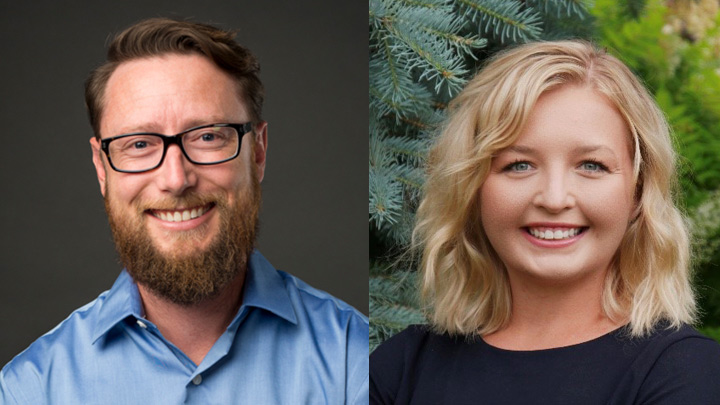
May 3, 2021

Mike Lang, left, fought cancer as a young adult and is pleased that Dr. Miranda Fidler-Benaoudia, leader of the Alberta Adolescent and Young Adult Cancer Survivor Study, is following almost 25,000 young cancer survivors to assess their long-term healthcare needs and outcomes. Photo supplied.
Story by Sharon Basaraba
Twelve years ago, Mike Lang’s dream life was just getting started. Newly married, he was working toward becoming a full-time ski patroller at Whistler Mountain and an adventure guide with teens in the summer. Young and fit, a cancer diagnosis was not on his radar.
“Life suddenly hit a very big road bump,” he says. “I’d lost the job I always wanted. We had to leave our friends on the coast and move back into my parents’ basement, since we had no savings to support us.”
Lang’s story is a familiar one for epidemiologist Dr. Miranda Fidler-Benaoudia. As leader of the Alberta Adolescent and Young Adult (AYA) Cancer Survivor Study, she’s following almost 25,000 young cancer survivors — diagnosed between the ages of 15-39 — to assess their long-term healthcare needs and outcomes.
“Cancer is traumatic at any age,” she says. “But young people are going through key developmental stages. These are relationship years — with friends and partners — and they’re establishing themselves professionally without having developed the coping skills we have later in life.
“That’s why we see they tend to get less education, have more financial challenges, and a greater burden of health issues later on.”
Cancers diagnosed before the age of 40 are far outweighed by those among older people. Fidler-Benaoudia says that means younger cancer patients are under-researched and not as well understood.
“Someone who’s diagnosed in their twenties could have another 60 years ahead of them. By studying this younger group, we can learn their unique challenges, and find misconceptions about cancer. So many young people didn’t see it coming. We don’t want them to be scared of it — just to be aware that cancer affects all age groups.”
The good news, she adds, is that broader screening programs and a drop in smoking have reduced the rates of cervical and lung cancers in younger adults. Less reassuring, however, is the trend over the last 30 years towards increased colon, rectal, kidney and breast cancers among patients under 40.
“Although we don’t have a good understanding of what causes cancers in young people, these are cancers generally associated with obesity, so it’s possible that the increases observed are linked to lower physical activity levels or dietary changes among young people,” says Fidler-Benaoudia.
Lang, now a father of two youngsters and a health researcher himself, says he’s happy that his cancer history is part of the huge database at the heart of her new study.
“Her research is powerful because the group is so large and comprehensive. Thanks to more awareness about emotional aspects such as depression and anxiety among young cancer patients, I know that the system can offer more support for people like me through diagnosis, treatment, and beyond.”